Books on Therapy & Recovered Memories:
Has A Child Been Molested?
by Lee Coleman, Patrick Clancy 2000
Every year thousands of children are sexually abused, but the system created in the 1970’s by a few mental health professionals and adopted by law enforcement and child protection agencies is making things worse. In this book, psychiatrist Lee Coleman and attorney Patrick Clancy describe how and why this is happening. By explaining the history of the child sexual abuse prevention movement, and exposing the fatal romance between mental health and law enforcement, the authors show how caring and intelligent people, including police officers, social workers, child therapists, teachers and even parents, may unwittingly create false accusations of sexual abuse.
The result is a new form of state-sponsored abuse of both children and those unjustly accused. Analysis of real investigations, such as the notorious McMartin Preschool case, makes it an indispensable guide for attorneys, judges, investigators and all those who seek the truth of sexual abuse accusations.
Therapy’s Delusions: The Myth of the Unconcious and the Exploitation of today’s Walking Worried.
by Ethan Watters and Richard Ofshe, (1999)
Link to website: www.chordate.com/therapys_delusions/index.html
Dedicated to providing information regarding the abuse of talk therapy. Many, if not most, of the more than two hundred types of talk therapy currently being practiced share a lineage of mistakes. This means not only that generations of therapy patients have been misled, but that we share cultural notions about the workings of our minds that are fundamentally incorrect. Ethan Watters and Richard Ofshe make this case strongly in their book Therapy’s Delusions. These pages intend to provide more information and resources to patients and professionals regarding talk therapy and its misuse.
Believed-In Imaginings: the narrative construction of reality.
edited by Joseph de Rivera and Theodore R. Sarbin, (1998)
Alien abduction, UFO sightings, satanic ritual abuse, repressed memories of abuse, multiple personality — a lot of people are convinced that they’ve experienced these things, but the experience may be only in their minds. How do people come to fervently believe in things that may have sprung purely from their own imaginations? In this fascinating collection of essays, leading scholars in psychology, anthropology and sociology bring scientific analysis to bear on a contentious, and often sensationalised, issue. ISBN 1-55798-521-9
Smiling though Tears.
by Pamela Freyd & EleanorGoldstein, (1997), Upton Books, Florida.
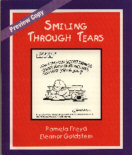
In the late 1980s and early 1990s, thousands of people (mostly middle-class white women in their 20s to 40s) began to recover ‘repressed’ memories of childhood sexual abuse and cruelty. In 1992, the FMS Foundation (headed by Pam Freyd) was founded. By 1993, cartoons about repressed memories and false memory syndrome began to appear, a testimony to how well the Foundation was bringing these issues to public awareness. Smiling though tears reprints about 125 of these cartoons, some of them devastatingly funny and cutting to the heart of tragic social phenomenon. They are accompanied by text which manages to pack a vast amount of useful pertinent information about the social, scientific and legal factors contributing to the ‘recovery’ movement, all explained in an easily understandable style. While there are now many other books recently published on this topic, none of them offer the material in such a concise, reader-friendly way, with of course the added bonus of hilariously funny cartoons.
If you are only going to read one book about recovered memories, make it this one!
Hystories – hysterical epidemics and modern media
by Elaine Showalter (1997) Columbia University Press, New York.
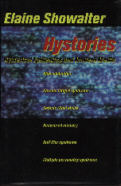
Alien abduction, Chronic fatigue syndrome, Satanic ritual abuse, Recovered memories, Gulf war syndrome, Multiple personality disorder. Welcome to an epidemic of strange new ‘diseases’, imaginary illnesses, and paranoid plots. Showalter provides a road map through a culture saturated with syndromes and obsessed with victimisation. Hystories is a wake-up call for protecting those virtues – reason, courage, scepticism, and personal responsibility – currently under siege, but which we will need for coping with change at the end of the millennium.
Psychology Astray: fallacies in studies of "repressed memory" and childhood trauma
by Harrison Pope Jr, (1997), Upton Books, Florida.
This is a short, very easy-to-read book which clearly and succinctly assesses the evidence about "repressed memory" and about whether sexual abuse causes psychiatric problems in adults. Pope demonstrates the flawed thinking and methodology in much of the research material presented as ‘proof’ that memories can be repressed or that adult problems are caused by childhood trauma. He uses examples and stories which make complex issues easy for the layman to understand.
Highly recommended.
Trauma & memory: clinical & legal controversies
edited by Paul Appelbaum, Lisa Uyehara & Mark Elin (1997), Oxford University Press, New York.
This is a comprehensive textbook which examines the memory and trauma controversy from a number of perspectives – memory research, clinical aspects, legal and policy issues). It includes chapters from people who could be classified as being sceptical of ‘memory repression’ (eg Elizabeth Loftus; Stephen Ceci; Fred Frankel) and those who have argued in favour of repression theory (eg Judith Herman; Bessel van der Kolk; Colin Ross).
Recommended for researchers and clinicians.
Whores of the Court: the fraud of psychiatric testimony and the rape of American justice.
By Margaret Hagen, (1997), Harper Collins, New York.
Dr Hagen has a Ph.D. in developmental psychology and currently teaches at Boston University. She quotes Martin Gardner, author of Science: Good, Bad, and Bogus.
"The extent to which judges, attorneys, and juries rely on junk science in the testimony of so-called ‘expert witnesses’ is the greatest scandal in today’s justice system as well as psychiatry. The tragedies that result are beyond belief."
She details how In both law and clinical psychology, the growth of the number of women in the ranks has been exponential over the last few decades in the USA, and points out that today the majority of American lawyers, clinical psychologists and psychiatrists are women. She says: "that the vast increase of the number of women in the mental health profession coincided with the boom years of the women’s liberation movement has had significant consequences for the interface between psychology and law."
She points out that: "Acceptance of their expertise has led us to trust professionals to make these decisions for the family court system. That means ultimately that we also grant them the power to make these decisions for our own families. The abstract need for society to protect its children becomes inevitably the rape of the rights of the real parents of individual children. Once again, the institutionalisation of society’s desire to ‘do good’ results in terrible harm for those in the path of the ‘do gooders’."
Hagen concludes: "The marriage of law and psychology has reached the heights of disproportionate power for the psychologists not just in the family courts but in all legal disputes in which a psychological matter is at issue."
Another quote here.
Dr Felicity Goodyear-Smith was a little more critical in her review: "While I would agree with Hagen that expert psychological testimony in the US courts is largely fraud, some of the content of this book at times too globally sweeping and under-referenced." (more).
Highly recommended.
Manufacturing Victims: what the psychology industry is doing to people.
by Tana Dineen (1996)., Robert Davies Publishing, Canada.
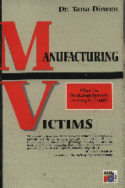
This hard-hitting, highly researched and well-referenced book chronicles how and why a psychological industry has developed in North America. Clinical practitioners (including psychologists, psychotherapists, psychiatrists and social workers) have created a huge growth industry for their own benefit: they are in the business of manufacturing victims and marketing treatments, causing untold damage to individuals, family and society in the process.
People who are anxious, a bit unhappy or just bored are turning more and more to psychology services. Some do this through weekly appointments; some do it by frequenting seminars and workshops; some do it by endlessly buying books on ‘abuse,’ ‘adult children,’ ‘trauma and stress,’ and ‘recovery;’ all in the pursuit of an elusive experience held out, like a candy or a pot of gold, by the psychology industry.
What is news is that psychology is manufacturing most of these victims, that it is doing this with motives based on power and profit, and that the industry turns these people into dependent ‘users’ with no escape from their problems.
The Recovered Memory/False Memory controversy which now rages is only the tip of the ice-berg of a far larger business in fabricated victims. While we have become used to hearing about all sorts of victims, from those of sexual harassment and verbal abuse, to those of ‘dysfunctional families’, divorce, academic discrimination, even vacation cancellation and home renovation, we have not yet paid attention to the psychological techniques which are being used to create and cater to these ‘victims.’ Nor have we noticed how it is the psychologists who are benefiting in the end from this victim-making, while the industry grows in power and affluence, as it creates a market dependent on its services.
Psychologists present themselves as concerned and caring healers working for the good of their clients, but the effects are damaged people, divided families, distorted justice, destroyed companies, and a weakened nation. This book describes the psychological industry: its sales and marketing, its public image and private motives, its power and weakness, as it manufactures victims.
Highly recomended.
Tana Dineen has a website here: http://scholefieldhouse.com/mv/
Multiple Personalities & False Memories – a sociocognative perspective
by Nicholas P Spanos (1996) American Psychological Association
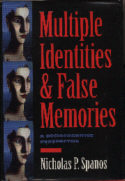
One of the world’s leading experts in the study of hypnosis argues that multiple personality disorder is not a legitimate psychiatric disorder, but a cultural construct, one with roots in earlier beliefs about demonic posession and upheld today by misguided psychotherapists and their patients.
Talk of the Devil: repressed memory and the ritual abuse witch-hunt
by Richard Guilliatt, (1996), Text Publishing Company, Melbourne.
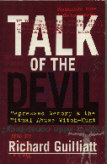
This book gives the Australian perspective on recovered memories of ritual abuse, and how public hysteria and zealous professionals have created a witch hunt which has destroyed families. It details some of the recent Australian high-profile cases.
Ashes to Ashes….Families to Dust, false allegations of child abuse: a roadmap for survivors.
by Dean Tong, (1996), FamRights Press, Florida.
Over the past couple of years there has been a flood of books and papers published about false allegations relating to the "recovered memory" scenario, but a relative dearth of material about the situation which affects about 1/3 of the cases documented by COSA, that of false sexual allegations arising during child access and custody disputes. This excellent new book by Dean Tong helps to fill the gap. Although there are some differences in specific laws and procedures between NZ and the USA, both our countries basically face the same problems: the use of sexual abuse allegations as a weapon in acrimonious custody disputes; the presumption of guilt by the social services; health professionals and the police; and the loss of access to one’s children on the basis of an unsubstantiated claim. Ashes to Ashes offers valuable information and practical ‘what to do’ advice for anyone who sadly finds himself in this situation.
Highly recommended.
Jeopardy in the Courtroom: a scientific analysis of children’s testimony
by Stephen Ceci and Maggie Bruck,(1995) American Psychological Association, Washington DC.
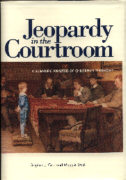
This is an invaluable book for anyone working with child witnesses (especially where sexual abuse allegations are involved), including lawyers, police, social workers and therapists. Ceci and Bruck are world-renowned researchers in the field of developmental psychology, and especially issues involving memory and suggestibility of children. This landmark book reviews the vast body of scientific research in this area and summarises the most relevant in evaluating and understanding children’s statements made in the legal arena. Topics covered include:
- prevalence and incidence of CSA
- theoretical overviews of memory and suggestibility
- history of search on suggestibility in the last 100 years
- dynamics of structured and therapeutic interviews with children
- recovery of repressed memories of CSA
- evaluation of research re age differences in reliability of children’s testimony
- general guidelines for interviewing children in a sensitive and professional manner.
Highly recommended for researchers, clinicians, and men falsely accused.
Satan‘s Silence: ritual abuse and the making of a modern American witch hunt.
by Debbie Nathan & Michael Snedeker, (1995), Harper Collins, USA.
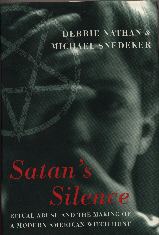
This excellent book traces the origins of the current hysteria about satanic ritual abuse and the strange alliance of feminists and religious fundamentalists which has fuelled it. It explores the lack of any scientific basis of the methods used by investigators in sexual abuse, and the inhumanity of the methods used to gather "evidence" against innocent people.
Some quotes here.
Highly recommended.
Rewriting the soul: multiple personality and the sciences of memory
by Ian Hacking
(1995), Princeton University Press, New Jersey.
A philosophical overview of the concept of what constitutes memory, and how the disorder of multiple personality has coming into being and flourished in the past 25 years.
Victims of Memory: Incest Accusations and Shattered Lives
by Mark Pendergrast
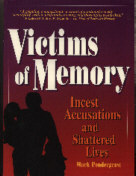
(1995), Upper access Books, Vermont.
Some quotes here.
Gullible’s Travels, or the importance of being multiple
by Michael Simpson, (1995), chapter in Dissociative Identity Disorder
edited by Cohen et al, published by Jason Ananson.
Convincing argument that Multiple Personality Disorder is a therapeutic artifact "linked to American psychobabble culture" and its incidence shows a direct relationship with the "degree of publicity given to multiplicity in the popular media". There is no scientific evidence that this is a naturally-occurring phenomenon, and the latter-day MPD movement shows many of the features of a religious cult". The author also states that there is no evidence that therapy which indulges "MPD" patients to be irresponsible children is of any benefit to them.
Satanic Ritual Abuse – Principles of Treatment
By Colin A. Ross, MD (1995) University of Toronto Press.
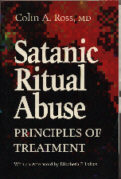
An expert in the ‘treatment’ of dissociative disorders, Dr Ross has encountered more than 300 patients with memories of alleged Satanic Ritual Abuse. Most of these patients have multiple personalities.
Making Monsters: false memories, psychotherapy, and sexual hysteria
by Richard Ofshe and Ethan Watters (1994), Charles Scribner’s Sons, New York.
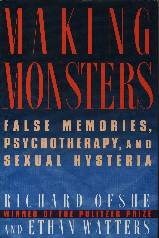
Some quotes here.
Return of the Furies; analysis of recovered memory therapy
by Ralph Underwager and Hollida Wakefield, (1994), Open Court Publishing Company, Chicago.
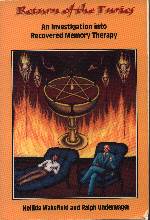
Some quotes here.
The authors have a website here: http://www.ipt-forensics.com/
The Myth of Repressed Memory
by Elizabeth Loftus & Katherine Ketcham, (1994), St Martin’s Press, New York.
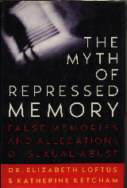
The leading American expert on memory exposes the recent wave of sex-abuse charges based on ‘repressed memories’ as akin to a 20th century version of the Salem Witch Trials.
Highly recomended.
Reviewed (here)
Suggestions of abuse: true and false memories of childhood sexual trauma
by Michael Yakpo, (1994), Simon and Schuster, New York.
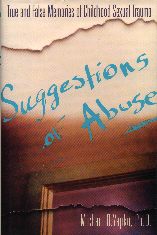
Another book about memory repression, the "scientific illiteracy" of many psychotherapists and the harm they can do their patients.
Some quotes here.
Beware the Talking Cure: psychotherapy can be hazardous to your mental health
by Terence Campbell, (1994), Upton Books, Florida.
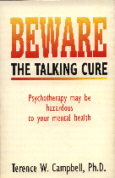
This book raises some hard questions about the merits of psychotherapy. It evaluates the effectiveness of different forms of therapy by reviewing the known research findings, and concludes that a psychotherapeutic practice may often be no more than a Rent-a-Friend business.
Remembering Satan – recovered memory and the shattering of a family.
by Lawrence Wright, (1994), Serpent’s Tail.
This book deals with the specific case of Paul Ingram and his family. When confronted with allegations from daughters who had "recovered" memories of childhood abuse by him, Ingram was sure they would not lie and therefore came to believe he must have "repressed" his memories of abusing them. He subsequently "recovered" memories through hypnosis and "confessed" to crimes he did not commit. This was clearly demonstrated when a psychologist suspicious of his confessions presented Ingram’s with so-called allegations from his daughters which the psychologist had in fact fabricated. Ingram then "recovered" memories of having committed these made-up crimes. He later realised that his memories of these offences were confabulations, but unfortunately he had already pleaded guilty and was convicted on this basis. He is still in prison.
House of Cards: psychology and psychotherapy built on myth.
by Robyn Dawes, (1994), Free Press, New York.

This highly recommended book examines current knowledge in the science of psychology and how the clinical practice of psychologists and psychotherapists operates on myths and assumptions not supported by this science, often with devastating consequences.
Treating survivors of Satanist abuse
by Valerie Sinason, (1994), Routledge, London and New York.
Despite the fact that satanic ritual abuse has never been substantiated and the chances that such allegations represent real events are negligible, this book proceeds to teach therapists how to treat such victims. Chapter 11 (A systematic approach) offers a model for dealing with satanically abused children. and was written by Arnon Bentovim and his wife Marianne (nee Tranter), who were brought to New Zealand by DSAC – Doctors for Sexual Abuse Care (more).
Abduction: human encounters with aliens
by John E Mack, (1994), Simon & Schuster, Great Britain.
John Mack is a Harvard Professor of Psychiatry who has investigated over 80 cases of people claiming they have been abducted by aliens. Mack assists these men, women and children to recover forgotten memories under hypnosis and he is convinced that they are not fabricating these encounters but are relating authentic experiences. His patients give remarkably consistent stories of meeting with small grey beings with large eyes who immobilise them, transport them to spacecraft (UFOs) and probe them in a battery of tests in what appear to be sexual and reproductive experiments. Reports of having body orifices probed, being sexually tortured and used for breeding purposes, including claims of multiple abortions of foetuses, are very reminiscent of the types of memories recovered by clients whose therapists believe in satanic ritual abuse.
Unchained memories: true memories of traumatic memories, lost and found
by Lenore Terr (1994), Basic Books, New York.
This is a book of case stories written in a popular press style. These are anecdotes alleging "recovery" of robustly repressed memories and are presented as evidence that this phenomenon is real.
Not recomended.
Satanic Panic: the creation of a contemporary legend.
by Jeffrey Victor, (1993), Open Court, Illinois.
A comprehensive analysis of the factors which have resulted in the urban legend that there is a secret network of criminal and fanatical worshippers of Satan who kidnap, sexually abuse, torture, sacrifice and cannibalise children. Victor demonstrates how networks of "child advocates", credulous social workers, police officers and ministers of religion have all helped to spread this unsubstantiated rumour, along with the testimony of "survivors" who have recovered memories of ritual abuse.
Recommended reading for anyone interested in satanic ritual allegations or cases of multiple personality disorder.
Warriors of Truth
by Kim McGregor, (1993), University of Otago Press, Dunedin.
Warriors of Truth is a self-help book for "sexual abuse survivors" written by an Auckland sexual abuse counsellor, herself a "survivor" of childhood abuse. She was assisted in writing it by grants from the McKenzie Foundation and Ministry of Women’s Affairs. The book is of very similar ilk to Courage to Heal (which McGregor highly recommends), and other books of this type from the United States. McGregor believes that memories of childhood sexual trauma may be totally blocked and later retrieved in therapy, including hypnosis, and through dreams and "flashbacks". She advocates always believing the victim, claiming that expressing any doubt is denial and may retraumatise the victim. Women can go for therapy whether they have any memories or not, they may accumulate a "knowing" they have been sexually abused but may never find out who the perpetrator was or what he did. Until they retrieve their memories, many women may have been pretending to themselves that they had a wonderful family who loved them.
She warns these women that their alleged offenders and other family members may turn against them and deny the events if confronted. When confronting an "offender", she recommends controlling the situation so that he is given no opportunity to respond. She emphasises that victims have a right to their anger, which she describes as a "positive energy", and does not advocate forgiveness. Many women may find it necessary to break all contact with their "family of origin" and form a "chosen family" of supportive friends. She also suggests telling (even anonymously) the alleged offender’s family, friends, employer and colleagues about the abuse. Whilst some of McGregor’s advice may be helpful to genuine incest victims, she does not appear to consider the possibility that some women’s memories may not represent actual events, and that unchallenging belief and encouragement may contribute to the generation of false memories. This is particularly likely given her endorsement of "memory retrieval" therapists and her literal interpretation of dreams and "flashbacks".
None of the substantial literature and research on memory recall and hypnosis is discussed or referenced. Much of McGregor’s information and advice is likely to contribute to the generation of false memories by vulnerable women who may read this book.
It is not recommended.
First Do No Harm : the Sexual Abuse Industry
by Dr Felicity Goodyear-Smith, (1993), Michael-Guy Publishers, Auckland
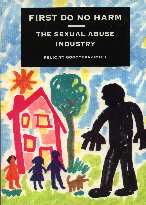
First Do No Harm sets out, in language suitable for an educated lay person, the current international research findings in the sexual abuse field. In particular it summarises the latest knowledge on suggestibility and the nature of memory.
It is a valuable resource for psychiatrists, psychologists, lawyers and other professionals working in the forensic setting. It is also of assistance to falsely-accused defendants in preparing their cases.
more about First Do No Harm here
Recomended for anyone interested in the impact of sexual abuse hysteria in NZ.



